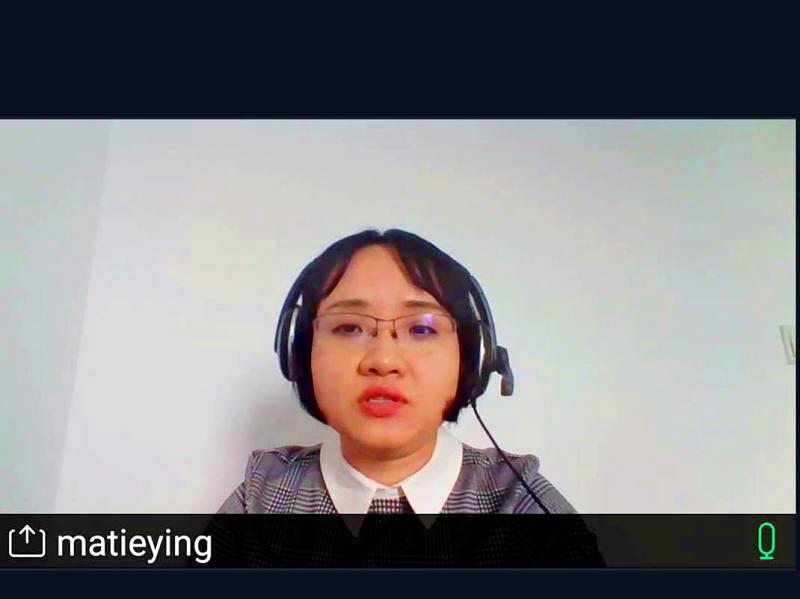DBS Bank Ltd (星展銀行) expects Taiwan’s economy to grow at a slower pace next year, as the nation’s semiconductor sector is likely to face a correction and rate hikes are likely to have a greater impact on the local economy, Singapore-based DBS economist Ma Tieying (馬鐵英) told a videoconference yesterday.
The bank forecasts GDP growth of 3 percent for Taiwan next year, lower than a 3.8 percent expansion expected this year, Ma said, citing a slower pace of growth in private consumption, investment and exports.
Next year, private consumption is expected to grow 2.4 percent annually, compared with a projected increase of 3.9 percent, while investment is expected to grow 3 percent instead of 5.2 percent and exports are expected to grow 1.9 percent instead of 5.7 percent, Ma said.

Photo: Lee Chin-hui, Taipei Times
Last year, Taiwan’s GDP grew 6.45 percent, and the Directorate-General of Budget, Accounting and Statistics (DGBAS) estimated a 4.42 percent increase for this year. The DGBAS has not released its forecast for next year.
DBS raised its forecast for inflation in Taiwan for this year from 1.3 percent to 2.3 percent, given higher oil prices and persistent inflation overseas, which has resulted in imported inflation, Ma said.
However, the imported inflation is likely to be a short-term phenomenon, and the nation’s inflation is expected to ease to 1.2 percent next year, she said.
“Some other countries are worried that they might see a ‘wage-price spiral,’ which refers to a strong link between wage growth and inflation, but Taiwan is less likely to witness such a phenomenon, as local merchants tend not to pass on higher costs to customers and wage increases have been mild,” Ma said.
DBS expects the central bank to continue raising rates unless Taiwan faces a considerable downside risk.
As a rule of thumb, once the central bank begins to increase rates, it is likely to do so for a while, Ma said, adding that Taiwan’s benchmark discount rate is relatively low.
“In 2004, the cycle of rate increases lasted four years, while the latest one, in 2010, lasted about one year, but was interrupted by the European debt crisis,” Ma said.
DBS expects the central bank to raise its benchmark discount rate by a total of 87.5 basis points to 2.25 percent by the end of next year, Ma said.

‘SWASTICAR’: Tesla CEO Elon Musk’s close association with Donald Trump has prompted opponents to brand him a ‘Nazi’ and resulted in a dramatic drop in sales Demonstrators descended on Tesla Inc dealerships across the US, and in Europe and Canada on Saturday to protest company chief Elon Musk, who has amassed extraordinary power as a top adviser to US President Donald Trump. Waving signs with messages such as “Musk is stealing our money” and “Reclaim our country,” the protests largely took place peacefully following fiery episodes of vandalism on Tesla vehicles, dealerships and other facilities in recent weeks that US officials have denounced as terrorism. Hundreds rallied on Saturday outside the Tesla dealership in Manhattan. Some blasted Musk, the world’s richest man, while others demanded the shuttering of his

ADVERSARIES: The new list includes 11 entities in China and one in Taiwan, which is a local branch of Chinese cloud computing firm Inspur Group The US added dozens of entities to a trade blacklist on Tuesday, the US Department of Commerce said, in part to disrupt Beijing’s artificial intelligence (AI) and advanced computing capabilities. The action affects 80 entities from countries including China, the United Arab Emirates and Iran, with the commerce department citing their “activities contrary to US national security and foreign policy.” Those added to the “entity list” are restricted from obtaining US items and technologies without government authorization. “We will not allow adversaries to exploit American technology to bolster their own militaries and threaten American lives,” US Secretary of Commerce Howard Lutnick said. The entities

Minister of Finance Chuang Tsui-yun (莊翠雲) yesterday told lawmakers that she “would not speculate,” but a “response plan” has been prepared in case Taiwan is targeted by US President Donald Trump’s reciprocal tariffs, which are to be announced on Wednesday next week. The Trump administration, including US Secretary of the Treasury Scott Bessent, has said that much of the proposed reciprocal tariffs would focus on the 15 countries that have the highest trade surpluses with the US. Bessent has referred to those countries as the “dirty 15,” but has not named them. Last year, Taiwan’s US$73.9 billion trade surplus with the US

Prices of gasoline and diesel products at domestic gas stations are to fall NT$0.2 and NT$0.1 per liter respectively this week, even though international crude oil prices rose last week, CPC Corp, Taiwan (台灣中油) and Formosa Petrochemical Corp (台塑石化) said yesterday. International crude oil prices continued rising last week, as the US Energy Information Administration reported a larger-than-expected drop in US commercial crude oil inventories, CPC said in a statement. Based on the company’s floating oil price formula, the cost of crude oil rose 2.38 percent last week from a week earlier, it said. News that US President Donald Trump plans a “secondary